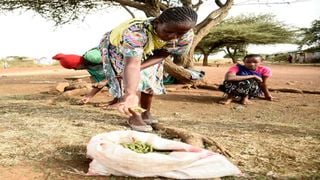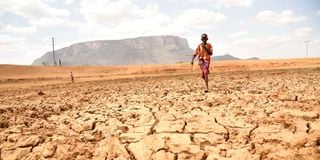
Mary Lemeroni and her children collect pods from an acacia tree to feed to her livestock at Sorandoru village in Samburu County in July.
| File | Nation Media GroupEducation
Premium
Learning derailed as hunger keeps children from schools
The ongoing drought has hit schools hard, with hundreds of thousands of learners staying away from classrooms due to hunger.
Although no official figures are available, spot checks by the Nation and interviews with education officials indicate that learning has suffered especially among nomadic communities.
Children have been forced to abandon school as they move with their families and livestock in search of pasture and water.
The situation has been worsened by delayed distribution of food by the national government for the free school feeding programme. More than 18 schools in three counties in Coast region have been closed.
In Samburu County, parents said their children did not report back when schools reopened in July.
“There is no rain. We have to move around and cannot leave the children behind. There is no food and we eat whatever we can find,” said 53 year-old Jackson Lemooge.
He was forced to withdraw his two children from Luwa Primary School in Opiroi in Samburu North and move 156 kilometres away.

Baringo, Kwale, Laikipia, Kitui, West Pokot and Lamu are among counties at risk of severe food shortages.
Together with his 83 head of cattle, they have scoured the terrains to Longewan near the border with Baringo County. A headteacher in Samburu East Constituency, who spoke on condition of anonymity told the Nation that drought and hunger has significantly lowered learners’ academic performance as they are not able to concentrate on studies on empty stomachs.
Other counties affected by drought are Turkana, Mandera and Marsabit. The drought is also exacerbating conflict over access to water and pasture. Samburu Special Programmes Chief Officer Daniel Lesaigor said half of the county’s population (150,000 people) is in dire need of food and water.
He, however, added that the county administration has introduced a Sh43 million feeding programme targeting learners in early childhood development and education centres.
“No doubt school attendance will improve because pupils will not be hungry. Pupils who are not hungry learn more efficiently. We want to improve the rate of normal mental and physical development and reduce stunted growth,” Governor Moses Lenolkulal had revealed during a past interview.
In Isiolo County, some of the primary schools in Garbatulla and Merti regions have experienced a reduction in learners’ attendance. County Director of Education Hussein Koriyow said some schools had depleted their food stock.
“We are hoping to get the provisions soon to address the situation that cuts across the entire country,” Dr Koriyow said yesterday.
In Meru County, more than 10 schools and over 50,000 residents of Tigania West are in need of food aid. The worst-hit areas include parts of Tigania West, Tigania East, Igembe Central, Igembe North and Buuri East where there farmers experienced a three-season crop failure.
The Village Trust (TVT), a non-governmental organisation operating in Tigania West and Tigania East, recently said at least 20 schools had sent appeals for food to start school feeding programmes. Mumui Location Chief Silas Kinyua said schools were in dire need of feeding programmes to sustain learners. In Central, Murang’a South Deputy County Commissioner Mawira Mungania said a team has been dispatched to collect data to be used in addressing hunger in schools. In Marsabit County, a committee has established that more than 210 schools are affected and 5,300 learners have been forced to stay out of school.

A herdsboy walks on a dry dam at Lerata in Samburu East in this picture taken on July 15, 2021.
Deputy Governor Solomon Gubo said different stakeholders including the county government and World Food Programme are willing to help retain learners in school by distributing food.
He spoke during the launch of a relief food programme targeting at least 1,300 households. He said more than 200,000 people in the county had been affected by the drought.
Affected schools
Teachers in Baringo and Turkana counties have also raised the red flag over the drought situation. Teachers in the affected schools in Tiaty East, Tiaty West and Baringo North sub-counties said enrolment has reduced drastically since institutions opened after parents moved with their school-going children in search of water and pasture.
Among the worst hit schools include Chepkalacha,Kositei, Katikit,Chemisik, Makany, Chesotim, Korelach, Lotita, Lodengo, Kakapul, Nasorot, Toplen, Akwichatis, Riong’o, Loiwat, Chesirimon,Toplen, Nakoko,Katagh,Krese,Sukut and Kongor primary schools.
Others in Baringo North that have been hit hard and are in dire need of food aid are Chepkesin, Kaborion, Kagir, Yatya, Chemoe, Ng’aratuko, Kosile, Rormoch, Tuluk, Moinonin, Kapkomon,Sibilo, Kamwetio, Chepkew, Tilingwo, Rondinin, Barketiew, Barsuswo, Loruk and Kapturo respectively. According to Yatya Primary School headteacher Thomas Kiburet, the situation has been worsened by the lack of a feeding programme.
“Most children in Tiaty Sub-county go to school to get food. Now that we have no food in school, most pupils, especially those who come from far away, have dropped out because they cannot walk for long distances on empty stomachs. We have no feeding programme except for some porridge which is not enough,” said Riong’o Primary School headteacher Collins Kases,. Enrolment at the school has dropped from 271 to 100 learners.
At PAG Katioko Primary School in Kalapata Ward in Turkana South Sub-county, the Nation found teachers and learners had not reported to school by 8:30 am. Amana Lochuch, who lives nearby, came to find out who the visitors were.
“Tired of waiting for relief food and food for our children at school, most of the parents migrated with their children. Those who have remained behind lost their livestock to drought or are aged,” Ms Lochuch said.
Lobolo Primary School which relies on Maisha Project, a non-governmental organisation, for the supply of maize, beans, cooking oil and rice every term for pupils from the Grade One to Six, has no food at the moment.
The drought situation in the Coast region has pushed wildlife out of different parks to villages further complicating the situation.
Taita Taveta County is the most affected where learning in ten schools has been disrupted as leaders call on learners and teachers not to risk their lives by going to school until elephants are contained in Tsavo East and West national parks.
‘Very dangerous’
Affected schools include Mgeno Primary, Mbele Secondary, Mbele Primary, Miasenyi Secondary, Miasenyi primary, David Kayanda Secondary, Mbulia Primary, as well as those in Kishushe, Jipe and Tausa areas. A parent in Kishushe, Agnes Mwachia, said the situation has affected learning in the area. She said the elephants have caused a lot of destruction whereby they have invaded farms and in some instances destroyed houses.
“We have to escort children as they go to school and pick them up in the evening. The elephants arrive unexpectedly at any time of the day and this is very dangerous not only for our children but the whole village. That is why we have resolved to wait until the situation improves to resume learning,” she said.
Yesterday, teachers’ unions in the county demanded the relocation of elephants. Teachers and learners report late to school and leave early to avoid the elephants that roam freely.
Facing hunger
In Lamu County, more than 9,000 learners are said to be affected. The County Government of Lamu has set aside Sh55 million to address famine in the region with at least 100,000 people facing hunger.
Deputy Governor Abdulhakim Aboud, who is also the Agriculture and Fisheries executive, revealed that the cash will cater for emergency cases arising from drought. Sh30 million will be used to buy relief food while Sh10 million will be used to distribute water.
National Treasury and Planning cabinet secretary Ukur Yatani allocated Sh1.8 billion in this year’s budget for the school feeding programme that is operated in areas that are food insecure, especially arid and semi-arid areas and poor neighbourhoods in urban areas.
Reporting by Geoffrey Ondieki, Manase Otsialo, David Muchui, Jacob Walter, Waweru Wairimu, Mwangi Muiruri, Florah Koech, Sammy Lutta, Lucy Mkanyika, Stephen Odour and Kalume Kazungu.





